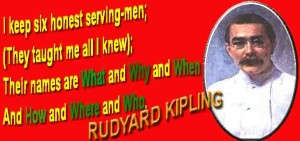 Years ago I attended a Day With Paul Luvera where the great trial lawyer quoted Rudyard Kipling’s “Six Honest Serving Men” when discussing cross examination. From Paul Luvera these six question areas have served me well.
Years ago I attended a Day With Paul Luvera where the great trial lawyer quoted Rudyard Kipling’s “Six Honest Serving Men” when discussing cross examination. From Paul Luvera these six question areas have served me well.
When I prepare for direct and cross I first write out my questions. This seeds my memory as I write my lines and read them back committing them to memory. At trial during direct I rarely refer to my lines. I simply have a conversation with the witness. For cross I do refer to my lines because my lines are the lines of the opposition witness. I note where in the deposition or in a document the witness line to my question is so I can impeach if he fails to agree.
In all cases I find myself referring to the “six honest serving-men.” These six friends are always with me as they often assist in deeper penetration in direct and cross. Below are some examples on how they can help:
Who. For direct I begin with who are you questions. The jury wants to know where plaintiff grew up-“Where did you go to high school and what year did you graduate?” The jury needs to learn about plaintiff”s job and activities before her injuries so they can appreciate how plaintiff has been impacted by her injuries. On cross who are you questions are effective when the witness has misled the jury on her background. Who are you questions allow penetration into background which can lead to destruction of the witness.
What. After finding out who the witness is, I am ready for what questions. On direct of plaintiff, what happened often follows who are you. What happened elicits the story on the mechanism of the injury. Also what questions elicit the facts of the injury. On cross what questions go to the foundation for the witness’s testimony : ” What documents have you relied upon.”
When. The remember when questions are: “When did you first have symptoms?” “When did you treat for your injuries?” “When were you last able to [engage in particular activity].” “When did you [do particular activity]?” On cross when questions pin down timing of events.
How. The how questions go to how plaintiff is overcoming injuries. If future medical is needed then this is a how question answer. If activities must be altered then this is a how question answer. For an expert how questions uncover how the expert arrived at his conclusion. For a lay witness how questions on cross go to how the witness is able to make his statement based on the facts.
Where. Where questions are important for painting a picture through testimony of where the event occurred. This holds true on both direct and cross. Key facts in every case occur at particular places. Our friend where ensures we make the place clear in the jury’s mind.
Why. The classic rule on cross examination is never ask a question unless I know the answer. This holds true on direct as well. Although why is one of my six friends, he is rarely used. When he is used, however, he can be deadly. I never use him though if he can be deadly to me.
Post Footer automatically generated by Add Post Footer Plugin for wordpress.


Some truly rattling work on behalf of the owner of this internet site , perfectly great content .